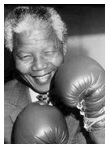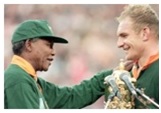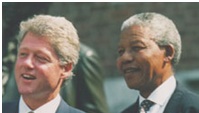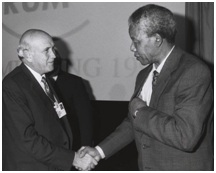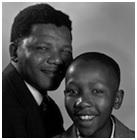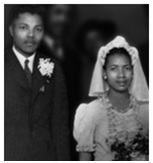|
 |
|
 |
Nelson Mandela Leadership
Nelson Mandela (1918 - 2013)
South African leader of the successful and largely peaceful fight against apartheid, the policy of racial discrimination and segregation by the white government. Imprisoned 1962-90, until 1982 on Robben Island, the notorious prison opposite Cape Town. William Henley’s poem that inspired him there, Invictus, is also the title of Clint Eastwood’s film about South Africa’s rugby world cup triumph in 1995. Mandela (pictured right) became the first black president of South Africa in 1994 after blacks finally got the vote. His autobiography, Long Walk to Freedom, was a worldwide best-seller.
Why is he a great leader?
1. Leading from behind Mandela (pictured right in 1937) likens a leader to a shepherd who guides his flock from behind and
In discussions with political colleagues, he didn’t join the debate too early, listening to them intently and then getting their support for his ideas by persuading them his policies were their own idea. But he also had the humility to change, if he failed.
2. Vision and integrity His compassion, forgiveness, courage and honesty won black and white people’s trust and respect, enabling him to achieve his dream of an apartheid-free and united South Africa. But he knew that this was only the start of building a great country. “With freedom come responsibilities” he said.
3. Determination and courage A lover of boxing (pictured right) and strenuous exercise, he was physically and mentally tough enough to survive all his years of hardship and torture in prison. He courageously and resolutely led from the front in the face of great cruelty and personal problems (two divorces and one son killed in a car crash). He always appeared fearless to inspire others to conquer their fear. Even in his darkest hours in prison, he was an optimist who never gave into despair.
4. Quiet reflection His time in prison gave him lots of time to think which helped him to understand people better, and the importance of love and forgiveness.
5. Charisma and service His charm, tolerance, humility and understanding won people over. At the 1995 rugby World Cup final he wore the South African rugby shirt, previously the national symbol of apartheid, to embrace the whole community (pictured right giving the cup to the South African, Francois Pienaar, played by Matt Damon, pictured below in the film Invictus). He realized that
But he never promised more than he could deliver for fear of losing their confidence. He saw humanity in everyone, even his cruellest guards in prison. “Man’s goodness is a flame that can be hidden but never extinguished”, he said, when he left prison. His mission was to liberate not only the blacks from oppression but also the whites from their hatred. So he included whites in his first Cabinet as president
6. Principled pragmatism He had ideals like freedom from apartheid, and, at his trial in 1964, he said he was prepared to die for them. But to achieve them he was always willing to try different policies and accept that decisions involve
contradictions and moral compromise. For example, he admired Gandhi’s (pictured right) belief in non-violent action but realized violence was essential from 1960 onwards in response to the white government’s increasing brutality.
7. Communication Mandela (pictured right in 1993 with the American president, Bill Clinton) made inspirational speeches, as in 1953 when he said: “There is no easy walk to freedom”. His charm wooed the public, and his smiling face on posters was crucial to his election as president.
8. Continuous learning and support He knew his enemy, learning about white South Africans and their history. He also learned from his
He had the help of many South Africans, particularly:
9. Strategy and tactics He was a brilliant political tactician. Often he said an issue “was not a question of principle; it was a question of tactics”.
10. Self-sacrifice He sacrificed his family for his fight for freedom, saying “the struggle is my life”. His eldest son, Thembi (pictured right together), once asked his mother, Evelyn, “Where does Daddy live?”, because he left so early and returned very late. This led to their divorce (pictured right below is their marriage in 1944). The break up affected Thembi badly. He would often wear his father’s clothes, because he missed him so much.
Key quotes on leadership Like the gardener, a leader must take responsibility for what he cultivates. To lead one’s people one must also truly know them.
Key quotes on fear and pain The brave man is not he who does not feel afraid, but he who conquers that fear. Strong convictions are the secret of surviving deprivation
Key quotes on love If people can learn to hate, they can learn to love. To make peace with your enemy, one must work with that enemy and that enemy becomes your partner.
Key quote on family To be the father of a nation is a great honour, but to be the father of a family is a greater joy. It was a joy I had far too little of.
Key quote on education Education is the most powerful weapon which you can use to change the world.
Key quote on success The greatest glory in living lies not in never falling, but in rising every time we fall.
Key quotes on freedom I have walked that long road to freedom. With freedom come responsibilities.
Key quote on influencing people It is an ideal for which I am prepared to die (talking about freedom and democracy for blacks at his trial in 1964).
Key quote on negotiating One of the things I learnt when I was negotiating was that until I changed myself I could not change others |
|
|
||
|
|
|
||
|
||
| Copyright © wisdomtowin.com All Rights Reserved | ||
|



